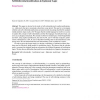Free Online Productivity Tools
i2Speak
i2Symbol
i2OCR
iTex2Img
iWeb2Print
iWeb2Shot
i2Type
iPdf2Split
iPdf2Merge
i2Bopomofo
i2Arabic
i2Style
i2Image
i2PDF
iLatex2Rtf
Sci2ools
123
click to vote
MST
2010
2010
Self-Referential Justifications in Epistemic Logic
This paper is devoted to the study of self-referential proofs and/or justifications, i.e., valid proofs that prove statements about these same proofs. The goal is to investigate whether such self-referential justifications are present in the reasoning described by standard modal epistemic logics such as S4. We argue that the modal language by itself is too coarse to capture this concept of self-referentiality and that the language of justification logic can serve as an adequate refinement. We consider well-known modal logics of knowledge/belief and show, using explicit justifications, that S4, D4, K4, and T with their respective justification counterparts LP, JD4, J4, and JT describe knowledge that is self-referential in some strong sense. We also demonstrate that self-referentiality can be avoided for K and D. In order to prove the former result, we develop a machinery of minimal evidence functions used to effectively build models for justification logics. We observe that the calculus...
| Added | 20 May 2011 |
| Updated | 20 May 2011 |
| Type | Journal |
| Year | 2010 |
| Where | MST |
| Authors | Roman Kuznets |
Comments (0)

